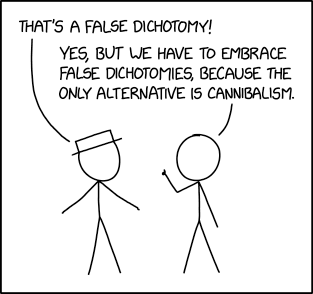False Dichotomy

There are two types of dichotomy: False dichotomies, true dichotomies, and surprise trichotomies.

There are two types of dichotomy: False dichotomies, true dichotomies, and surprise trichotomies.
A dichotomy is two alternatives which are normally mutually exclusive (such as the dichotomy between a flat Earth and non-flat Earth). A false dichotomy is a logical fallacy based on an incorrect perception of limited options (for example: if the page background isn't white, it is black).
Cueball has apparently made one such error and is being called out by White Hat for it. Upon having this pointed out to him, Cueball says that we must embrace false dichotomies, because the only other option is cannibalism. This statement is another false dichotomy, as presenting false dichotomies is not the only alternative to cannibalism.[citation needed] The reverse (that cannibalism is incompatible with expressing false dichotomies) is also not potentially true, as eating people may eventually result in having nobody you need to present false dichotomies to.
Cueball has thus created another false dichotomy to excuse his first, at which referring to cannibalism is most likely a non-sequitur argument.
The title text states that there are two kinds of dichotomies, making a dichotomy in itself. Due to three types of dichotomy being mentioned, and only two being foreshadowed, this statement is itself a surprise trichotomy, or three-parted choice. The title text is a variation of the "Two kinds of People" joke. The classic math nerd variant is "There are three kinds of people in the world, those who can count, and those who can't." Alternatively, it may refer to a variation about binary. The original joke usually goes something like this: "There are 10 types of people: those who know binary, and those who don't." The variation is usually something like the following: "There are 10 types of people: those who know binary, and those who don't, and those who weren't expecting a ternary joke." Another version of this kind of joke is "there are two kinds of people: those who can extrapolate from an incomplete data set,"